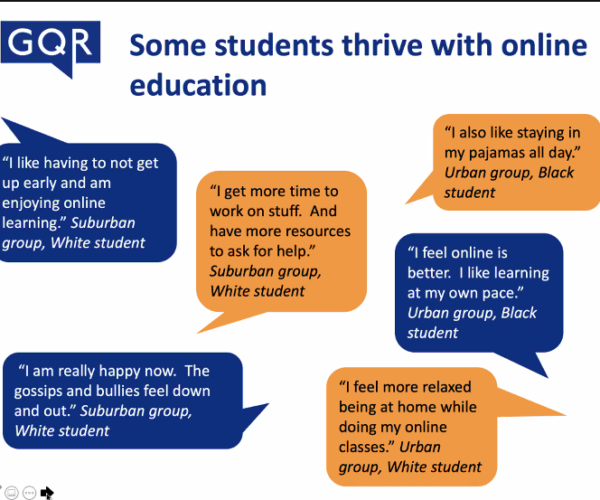Students are showing great resilience during COVID but parents and educators urge greater investments in education as learners recover from the pandemic.
Middle and high schoolers have maintained trust in their teachers and, in fact, want more interaction with educators regardless of whether districts are in-person, hybrid or remote, according to a “Student Voices” survey released Wednesdsay by the National Education Association and National PTA.
However, students—particularly Black and Latinx learners, and those who live in poverty or rural areas—are struggling with isolation, the risk of falling behind academically and family economic upheaval, National Education Association President Becky Pringle said in a webinar.
“We know that the traumas and disruptions of 2020 will play an enduring role in our students’ lives,” Pringle said. “These students have made it clear that yes, they are struggling, and they’re also making it clear that they have a sense of their own agency. They’ve done a lot to adapt to their current realities.”
Student Voice solutions: 10 ways leaders can solve education’s COVID recovery
The survey asked urban, suburban and rural students aged 13 to 18 years, in grades 7 through 12, about the most pressing issues and inequities they face as districts toggle from online to hybrid to in-person learning.
Here are some key findings:
- 56% of students describe themselves and their family as “doing OK” during the pandemic while only 16% of students report they are struggling. These numbers remain consistent along different racial groups.
- Four in 10 students report significant family economic stress, and the same amount have had a family member contract the virus.
- Students complain of boredom, possibly brought on by social isolation and a lack of social interaction.
- Some students report that they have used the pandemic to reconnect with their families, take on hobbies, exercise and even reconsider career goals.
- 58% of students say they were doing well academically before the virus; only 32% believe they are doing well currently. The self-reported academic decline remains consistent along different racial subgroups, and there is relatively little difference between students learning in-person, in hybrid mode and fully online.
- Younger students and students whose parents did not attend college as well as students in hybrid situations are the most likely to report an academic decline.
- 88% of students say they trust their teachers to teach them this year, and 76% believe they are getting a good education, despite the recognition that their teachers lack resources and time.
Going forward, students are most eager to have more interaction with teachers, including one-on-one time, opportunities for tutoring and faster feedback on assignments.
More from DA: NEA teachers union sets 3 priorities for Biden-Harris









